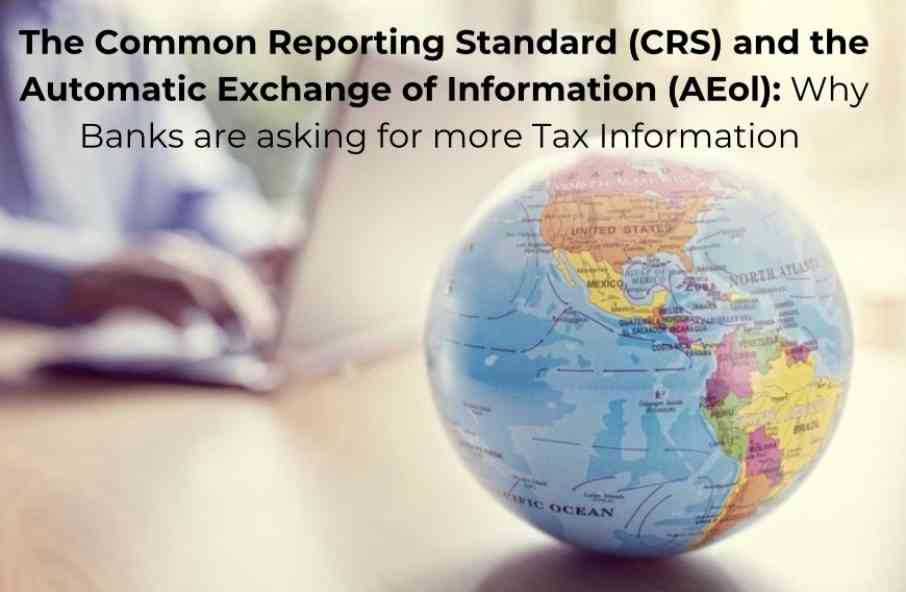The Common Reporting Standard (CRS) and the Automatic Exchange of Information (AEoI): Why Banks Are Asking for More Tax Information
- Authors
-
-

- Name
- Patrick Maflin
-

In recent years, global efforts to increase financial transparency have led to significant changes in how banks handle tax compliance.
Two major initiatives driving this shift are the Common Reporting Standard (CRS) and the Automatic Exchange of Information (AEoI), which were introduced to combat tax evasion and improve cooperation between tax authorities worldwide.
While these measures were originally designed to ensure that individuals and businesses pay the correct amount of tax in their country of residence, they have also resulted in a much stricter approach from banks.
Customers are now facing increased scrutiny, more frequent requests for tax-related information, and, in some cases, the risk of account closures if they fail to provide the necessary details.
Why Banks Are Becoming More Compliance-Focused
Since the introduction of the CRS by the Organisation for Economic Co-operation and Development (OECD) in 2014, financial institutions in more than 100 countries have been required to collect and report tax residency information to their local tax authorities.
These authorities then share the information with other jurisdictions under AEoI agreements, creating a global network of tax data exchange.
To comply with these regulations, banks have significantly increased their due diligence processes.
In the past, customers could often open accounts by simply self-declaring their tax residence.
Now, financial institutions require much more documentation to ensure compliance with international tax laws.
Many banks now ask customers to provide tax identification numbers (TINs/UTRs), complete detailed self-certification forms, and, in some cases, submit supporting documents such as tax residency certificates or proof of foreign tax obligations.
This shift is not limited to new customers.
Banks are also reviewing their existing client databases, requesting updated tax residency information from long-standing account holders.
If discrepancies arise or customers fail to respond, banks may take action, which could include restricting transactions, freezing accounts, or, in extreme cases, closing them entirely.
What Information Are Banks Requesting?
Individuals and businesses are now required to provide more detailed tax-related information than ever before.
Some of the key areas where customers are facing increased scrutiny include:
Multiple tax residencies
If a customer has tax obligations in more than one country, banks may require them to disclose all relevant jurisdictions.
This is particularly important for expatriates, dual citizens, and individuals with international financial interests.
TIN/UTR verification
Many banks are now requiring official verification of tax identification numbers to ensure they match records held by tax authorities.
In some cases, additional validation may be needed from government agencies.
Periodic account reviews
Banks are not just collecting tax information at the point of account opening; they are also conducting ongoing reviews to ensure that customers remain within HMRC compliance.
This means that even long-term account holders may be asked to provide updated tax details or confirm their residency status.
Documentation for complex structures
Businesses with multiple layers of ownership, offshore holdings, or trust structures are facing more rigorous documentation requirements.
Financial institutions are under pressure to identify the ultimate beneficial owners (UBOs) of these entities, in line with anti-money laundering (AML) regulations.
The Impact on Individuals and Businesses
For many customers, these changes have introduced an additional layer of administrative burden.
Completing complex tax forms, keeping track of residency obligations, and ensuring that all required documentation is in order can be time-consuming and confusing.
In some cases, individuals may not even be aware of their tax residency status in multiple jurisdictions, leading to unintentional non-compliance.
Mistakes or delays in providing the requested information can have serious consequences.
If a bank is unable to verify a customer's tax residency status, they may report the account to tax authorities as part of their CRS obligations.
This could lead to further inquiries, unexpected tax liabilities, or even penalties in some jurisdictions.
At the same time, banks themselves have had to adapt to the increasing complexity of tax compliance.
Many financial institutions have expanded their compliance teams, implemented new technology to streamline data collection, and introduced artificial intelligence (AI) and machine learning (ML) tools to detect inconsistencies in customer-provided information.
These investments highlight just how seriously banks are taking their obligations under CRS and AEoI.
What You Can Do to Stay Compliant
If you have been contacted by your bank requesting updated tax information, it’s important to respond promptly and accurately.
Failing to provide the required details could lead to restrictions on your account or even the possibility of it being closed.
If you're unsure about your tax residency status, need help completing the necessary forms, or are concerned about potential compliance issues, seeking professional advice can make the process much easier.
Our tax consultation service is designed to help individuals and businesses navigate these new banking requirements with confidence.
If you've been asked to provide tax information and want to ensure you're meeting all necessary obligations, we can guide you through the process and help protect your financial interests.
Get in touch today to discuss your situation and safeguard your financial future.


